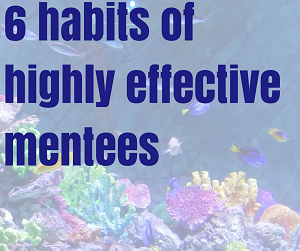Written by Reid Hoffman & Ben Casnocha
There’s no shortage of people hailing the benefits of mentors. There’s also ample advice on how to find mentors. Few talk about what to do once you’ve made contact with someone who wants to help you. You sit down to lunch with a potential mentor. What do you say? How do you act? How frequently do you follow up, especially if the person is busy and important?
I know many professionals who would like to be mentors but are not, mainly because once they start interacting with a potential mentee they find it’s not nearly as fulfilling as they imagined. I place the blame in many cases on the mentee and how s/he approaches those early interactions. Smart mentees realize that successful mentoring relationships don’t necessarily happen automatically; rather, they’re the result of genuine engagement and sustained effort.
Drawing upon my own experience and that of others, here are six habits of highly effective mentees.
1. It’s all about the questions you ask.
Here’s an example of a bad question: “What career should I go into?” Expect a worthless blue sky answer, or something that corresponds closely to what he does.
Here’s a better question: “I’m deciding between these two jobs, which each offer these benefits and these drawbacks. What do you think? Which factors should I consider most highly – salary, geography, etc?”
In other words, present options and then get help on how to think about the options.
Here’s a common question mentees ask that I think is problematic: “What would you do if you were me / you were in my shoes?” This is ambiguous. This either means, “What would you do in this situation?” which is asking what the mentor herself would do after considering her own situation, which is not what you really want. Or, it means, “If you were me, you had all the same strengths, weaknesses, opportunities, and threats as me, what would you do?” It’s unlikely the mentor (or anyone) knows you well enough to have a 360 degree perspective. So the question fails with either interpretation.
2. Have strong beliefs, weakly held.
This is maybe the hardest habit: How do you at once demonstrate greenness, a blank slate, and open-mindedness (ie, a genuine interest in hearing an advisor’s ideas and potentially incorporating them into your own life) while also showing potential through your existing ideas and convictions? In other words, mentors want to mentor someone they can influence, but they only want to influence people they think can be successful, and people bound for success tend to have beliefs about the world. Asking a million questions but putting forth no ideas of your own, or simply nodding hungrily at anything and everything the mentor says, puts you too far in the “green” direction. By the same token, acting like you’ve figured out the world is just as much a turn-off — who wants to help someone who thinks he doesn’t need help?
So how do you walk the line between these two extremes? Try articulating your existing stance to your mentor in an expository fashion: here is what I feel, here is why, here is my level of certainty.
3. Have a long term perspective.
Mentoring relationships are like any friendship or romance — it takes time. Lots of time. Years of time. If things are going well, don’t try to cover every topic on your mind in one meeting. Meander. Dive deep. Have a memorable conversation about just a couple things. Don’t bring a “pump-and-dump” attitude to the relationship.
4. Be open to topics not on your short-term agenda.
Say you’re trying to start a business and you meet with a start-up expert. You want to pick her brain about successful start-ups. One problem: everyone wants to ask this gal about start-ups. She’s bored of doling out the same advice. So spend some time probing her on off-the-beaten path topics. Religion? Politics? Wander on the path less trekked upon.
For example, if you’re young, everyone is going to want to give you advice about colleges and higher ed. Be open to hearing it.
In the long term, you’ll have plenty of time to cover the topic that made you interested in her in the first place.
5. Follow up by showing interest in them.
To form a long term relationship you need to stay in touch. But what does “stay in touch mean”? A meeting a year? An email every month? Phone calls? It all depends on the situation.
Nothing beats an in-person interaction. So aim for those, but it can be hard to see busy people. At the least, email him four times a year.
Remember, in your communications, show interest in his life, and he’ll reciprocate and show interest in your life. Send a relevant article, or comment on a move his company recently made.
If the mentor reads blogs, maintaining a blog is one of the best ways to stay in touch. Because it is “opt-in” — people choose to read blogs — you can get away with more frequent communications. If you email someone, he feels an obligation to read and respond. If you write a blog post, you’ve created no such obligation, and he still will probably read it in his RSS reader.
Try to be creative in your communications both in format (try postcards!) and timing (never send an update during the holiday season).
6. Don’t make the mentor do the work.
It’s not up to the mentor to figure out how to mentor you. It’s up to you to figure out what you need help on.
If you are in Melbourne and need more information on how to become a mortgage broker or you need a mortgage broker mentor, take a look at our exciting website https://www.melbournemortgagebrokermentor.com.au/career/

